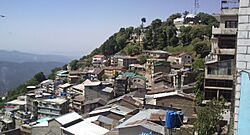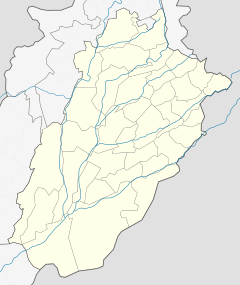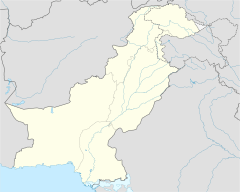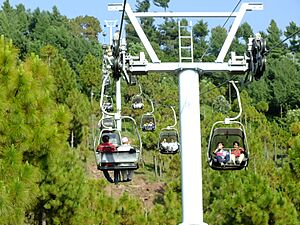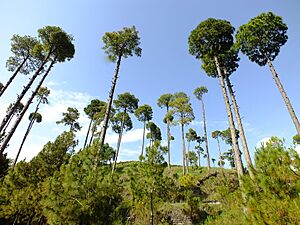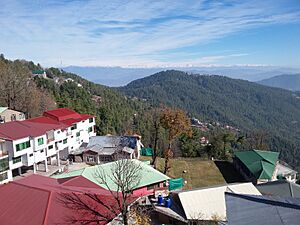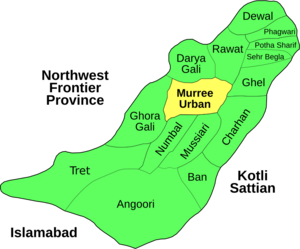Murree facts for kids
Quick facts for kids
Murree
مری
|
|
|---|---|
|
Clockwise from top: Sunset over Murree's Holy Trinity Church, Murree, General Post Office, view of the valley and Mall Road, colonial-era Mall in central Murree, Patriata's Gondola Lift
|
|
| Nickname(s):
The Depot (British Raj), The White City
|
|
|
Location in Punjab, Pakistan
|
|
| Country | |
| Province | |
| District | Murree |
| Tehsil | Murree |
| Elevation | 2,291.2 m (7,517.1 ft) |
| Population
(2017)
|
|
| • Total | 352,329 |
| Time zone | UTC+5 (PKT) |
| Postal code |
47150
|
| Union Councils | 8 |
Murree (in Punjabi and Urdu: Urdu: مری) is a beautiful mountain resort city in Pakistan. It's located in the Galyat region of the Pir Panjal Range, within the Murree District of Punjab, Pakistan. Murree is about 30 kilometers (19 miles) northeast of Islamabad. It sits at an average height of 2,291 meters (about 7,517 feet) above sea level. The British built this town during their rule to escape the scorching heat in the plains of Punjab during the summer.
Construction of Murree began in 1851 on a hill as a place for British troops to recover. The main town was built in 1853. A central road, known as "Mall Road," was also created. Murree was the summer capital for the colonial Punjab Government until 1876.
Murree became a popular spot for British visitors. Many famous British people were born here. During the colonial era, some places like Lawrence College, Murree were only for Europeans.
Since independence of Pakistan in 1947, Murree has remained a popular hill station. People love its pleasant summer weather. Many tourists from Islamabad and Rawalpindi visit the town. It also serves as a stop for tourists heading to Azad Kashmir and Abbottabad. The town is known for its unique Tudorbethan and neo-gothic buildings. The Government of Pakistan has a summer retreat in Murree, where important visitors often stay.
Contents
History of Murree

Murree, once called Marhee, was first noticed as a good spot for a hill station by Major James Abbott in 1847.
How Murree Was Built
The town's early development started in 1851. It was led by Sir Henry Lawrence, who was the President of the Punjab Administrative Board. Murree was first set up as a place for British soldiers to rest and get well. The local government officially made it a municipality in 1850.
The permanent town of Murree was built at Sunnybank in 1853. A church was opened in May 1857. The main road, now called Jinnah Road but still known as "The Mall," was also constructed. Important shops, like the Post Office and stores selling European goods, were set up near the church. Until 1947, only Europeans were allowed on Mall Road.
Murree During British Rule
In the summer of 1857, a rebellion against the British started. Local tribes from Murree and Hazara attacked the British soldiers in Murree. However, the British eventually defeated the tribes. From 1873 to 1875, Murree was the summer home for the Punjab government. After 1876, the headquarters moved to Shimla.
A railway connection to Lahore (the capital of Punjab) through Rawalpindi made Murree a popular place for officials. Many villas and houses were built for English families, giving the town a European feel. The surrounding hills were often filled with British troops during summer. Visitors from the plains and travelers to Kashmir also came to Murree. You could travel to Rawalpindi by tanga, which is a type of horse-drawn carriage.
Murree in the Early 1900s
In 1901, Murree had a permanent population of 1,844 people. But if you included summer visitors, the number could go up to 10,000.
In early January 2022, a severe snowstorm hit Murree. Sadly, over 20 people died while trying to reach the town.
Climate in Murree
Murree has a subtropical highland climate. This means it has cold, snowy winters and relatively cool summers. It also gets a lot more rain than lower areas, and there's often fog. It rains all year, with the most rain in winter and again in July and August. On average, Murree gets about 1,904 millimeters (75 inches) of rain each year. It also receives about 1,590 millimeters (63 inches) of snow per year. Heavy snowfall usually happens in January and February.
| Climate data for Muree | |||||||||||||
|---|---|---|---|---|---|---|---|---|---|---|---|---|---|
| Month | Jan | Feb | Mar | Apr | May | Jun | Jul | Aug | Sep | Oct | Nov | Dec | Year |
| Record high °C (°F) | 17.2 (63.0) |
19.8 (67.6) |
23.0 (73.4) |
26.0 (78.8) |
32.0 (89.6) |
32.2 (90.0) |
31.7 (89.1) |
27.2 (81.0) |
25.6 (78.1) |
25.0 (77.0) |
22.3 (72.1) |
21.1 (70.0) |
32.2 (90.0) |
| Mean daily maximum °C (°F) | 7.2 (45.0) |
7.5 (45.5) |
11.6 (52.9) |
17.2 (63.0) |
21.7 (71.1) |
25.1 (77.2) |
22.4 (72.3) |
21.4 (70.5) |
20.9 (69.6) |
18.6 (65.5) |
14.5 (58.1) |
10.2 (50.4) |
16.5 (61.8) |
| Daily mean °C (°F) | 3.7 (38.7) |
4.0 (39.2) |
8.0 (46.4) |
13.2 (55.8) |
17.3 (63.1) |
20.6 (69.1) |
19.1 (66.4) |
18.4 (65.1) |
17.2 (63.0) |
14.3 (57.7) |
10.3 (50.5) |
6.3 (43.3) |
12.7 (54.9) |
| Mean daily minimum °C (°F) | 0.1 (32.2) |
0.5 (32.9) |
4.3 (39.7) |
9.1 (48.4) |
12.8 (55.0) |
16.1 (61.0) |
15.7 (60.3) |
15.4 (59.7) |
13.4 (56.1) |
10.1 (50.2) |
6.2 (43.2) |
2.4 (36.3) |
8.8 (47.9) |
| Record low °C (°F) | −8.4 (16.9) |
−10.6 (12.9) |
−7 (19) |
−3.3 (26.1) |
0.6 (33.1) |
3.6 (38.5) |
8.9 (48.0) |
10.0 (50.0) |
6.0 (42.8) |
1.1 (34.0) |
−3.3 (26.1) |
−10.5 (13.1) |
−10.6 (12.9) |
| Average precipitation mm (inches) | 126.5 (4.98) |
145.0 (5.71) |
176.8 (6.96) |
133.0 (5.24) |
91.9 (3.62) |
142.0 (5.59) |
418.3 (16.47) |
336.3 (13.24) |
161.5 (6.36) |
70.2 (2.76) |
32.5 (1.28) |
70.3 (2.77) |
1,904.3 (74.98) |
| Source: NOAA (1961–1990) | |||||||||||||
Murree's Administration
Murree is a district in the northern part of the Pakistani province of Punjab. It has two smaller administrative areas called tehsils: Kotli Sattian and Murree.
In March 2022, the Punjab Government made Murree a district. They appointed the first Additional Deputy Commissioner. Its status was officially changed from a tehsil to a district in October 2022.
However, the temporary Punjab Government changed its status back in February 2023. The Lahore High Court later reversed this decision. In September 2023, a Deputy Commissioner was again appointed in Murree. The government elected after February 2024 decided to keep Murree as a district because it's very important for tourism.
| Sr. | Tehsil | Headquarters | Area
(km2) |
Population
(2017) |
|---|---|---|---|---|
| 1 | Kotli Sattian | Kotli Sattian | 304 | 119,312 |
| 2 | Murree | Murree | 434 | 233,017 |
| Total | 738 | 352,329 | ||
Here are some of the areas and Union Councils in Murree:
- Rawalpindi District
- Kohati KakRahi
- Bhurban
- Dewal Sharif
- Darya Gali
- Gulehra Gali
- Uc Ghel
- Bochal Kakrahi
- Ghora Gali
- Bansara Gali
- Jhika Gali
- Mohra Sharif
- Potha Sharif
- Aliot, Murree
- Sehr Bagla
- Patriata
- Karore
- Phagwari
- Las Kothar
- Numbal
- Mussiyari
Military Presence
For military purposes, Murree is divided into two separate cantonments: Murree Gali Cantonment and Murree Hills Cantonment. Murree is home to the main office of the 12th Infantry Division of the Pakistan Army. It also has several schools and training centers, plus a hospital for military personnel.
The Pakistan Air Force also has a base at Lower Topa, near Patriata. This base includes a military boarding school for boys, called PAF Public School Lower Topa.
During the British Raj, Murree was the summer headquarters for the Lieutenant General of the Northern Command. Other important officials also lived here for part of the season. The site was chosen in 1850, and building started right away. In 1851, temporary housing was made for troops, and in 1853, permanent barracks were built. The usual military force included two mountain artillery units and one infantry battalion.
Famous People from Murree
- Harold Hall, a cricketer and British civil servant
- Parikshit Sahni, an Indian actor
- Pushpinder Singh Chopra, an aviation expert
- Muhammad Nawaz Abbasi, a former justice of the Supreme Court of Pakistan
- Shahid Khakan Abbasi, a former Prime Minister of Pakistan
- Francis Younghusband, an explorer
Sister Cities





